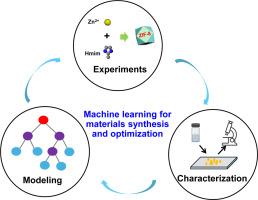Transfer learning-based modeling of synthesis-particle size relationships in metal-organic frameworks
引用次数: 0
Abstract
Metal–organic frameworks (MOFs) are promising materials for applications such as gas storage and drug delivery, where their performance is strongly affected by morphology such as particle size. However, the relationships between synthesis conditions and the resulting particle size are complex and remain poorly understood. This work develops a transfer learning-based modeling framework to quantitatively predict how synthesis parameters affect the particle size of zeolitic imidazolate framework-8 (ZIF-8). Using an extreme gradient boosting algorithm (XGBoost), we first build a baseline predictive model trained on a combined dataset of literature and in-house experimental data. To improve performance, we explore transfer learning that pretrains a model on literature data to fix structural hyperparameters such as the number of trees and then fine-tune decision splits with a weighting scheme to emphasize in-house data. To further address data scarcity, we adopt synthetic data augmentation through local interpolation in synthesis parameter space. New data are generated by interpolating between nearby in-house synthesis conditions, preserving the physical meaning of augmented samples. Our results show that transfer learning and data augmentation significantly improve model accuracy and interpretability. This work demonstrates the potential of transfer learning to bridge heterogeneous data sources and accelerate data-driven materials synthesis optimization.

基于迁移学习的金属-有机框架合成-粒度关系建模
金属有机框架(mof)在气体储存和药物输送等应用中是很有前途的材料,在这些应用中,它们的性能受到颗粒大小等形态的强烈影响。然而,合成条件和所得粒度之间的关系是复杂的,仍然知之甚少。本研究开发了一个基于迁移学习的建模框架,以定量预测合成参数如何影响沸石咪唑酸框架-8 (ZIF-8)的粒径。使用极端梯度增强算法(XGBoost),我们首先在文献和内部实验数据的组合数据集上建立了一个基线预测模型。为了提高性能,我们探索了迁移学习,该学习在文献数据上预训练模型以固定结构超参数(如树的数量),然后使用加权方案微调决策分割以强调内部数据。为了进一步解决数据稀缺性问题,我们在合成参数空间中采用局部插值的方法对合成数据进行增强。通过在附近的内部合成条件之间插值生成新数据,保留增强样本的物理意义。我们的研究结果表明,迁移学习和数据增强显著提高了模型的准确性和可解释性。这项工作证明了迁移学习在连接异构数据源和加速数据驱动的材料合成优化方面的潜力。
本文章由计算机程序翻译,如有差异,请以英文原文为准。
求助全文
约1分钟内获得全文
求助全文

 求助内容:
求助内容: 应助结果提醒方式:
应助结果提醒方式:


